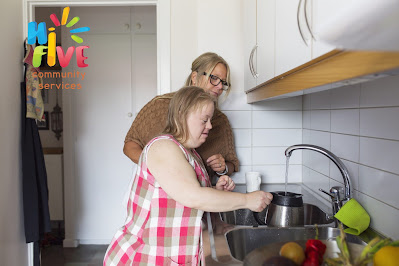Respite houses are invaluable resources for families and individuals caring for loved ones with special needs. These facilities provide temporary accommodation and support services, offering individuals opportunities for socialization and leisure while giving caregivers much-needed relief. Whether for a few hours or several weeks, the respite experience is immensely beneficial. However, exploring the myriad options available can be overwhelming without proper guidance.
Enter Hi Five, an NDIS Disability Service Provider offering trusted support coordination services. Hi Five helps individuals with special needs and their families navigate the complex landscape of respite house options. This article will delve into how trusted support coordination streamlines personalized pathways to respite facility choices, providing expert assistance at every step.
Understanding Respite House Options:
Respite houses cater to individuals with disabilities by providing short-term accommodation and support services. These facilities not only benefit individuals but also alleviate the stress experienced by caregivers. Respite care allows caregivers to rest, travel, or spend time with other family members and friends while ensuring their loved ones receive the care they need. From residential homes to specialized facilities for various medical needs and disabilities, a wide range of respite care options are available.
Importance of Personalized Pathways:
Personalized pathways prioritize the specific needs and goals of individuals with special needs. Recognizing that each person is unique, this approach ensures that the chosen respite accommodation aligns seamlessly with their lifestyle, promoting independence and well-being. By tailoring solutions to individual requirements, personalized pathways enhance the overall respite experience.
Expert Guidance of Support Coordination:
Support coordination plays a vital role in exploring respite facility options. Skilled professionals assist participants by providing tailored services based on their needs, preferences, and goals. With in-depth knowledge of various respite accommodations and eligibility criteria, support coordinators guide individuals and their families through the selection process, ensuring informed decisions.
Assessing Needs and Preferences:
Support coordinators conduct comprehensive assessments of individuals' needs and preferences through interviews with them, their families, service providers, and other stakeholders. By understanding specific requirements, coordinators identify care options that best meet individuals' goals and preferences, ensuring a customized respite experience.
Exploring Available Respite Facility Options:
Support coordinators have extensive knowledge of the temporary lodging landscape, including information about providers, facilities, services, and locations. Armed with this knowledge, they provide individuals with a comprehensive list of available options to explore and compare. This thorough exploration enables informed decision-making, empowering individuals and their families to select the most suitable respite house.
Conclusion:
In conclusion, a personalized approach supported by skilled professional support coordinators is essential for individuals with disabilities to explore respite facilities effectively. By understanding participants' unique needs, aspirations, goals, and preferences, support coordinators provide comprehensive and personalized suggestions. Through personalized pathways and expert guidance, participants can discover the ideal respite house option that enhances their quality of life.
With Hi Five's trusted support coordination, individuals and their families can navigate respite house options with confidence, ensuring a rewarding respite experience tailored to their specific needs.

Comments
Post a Comment